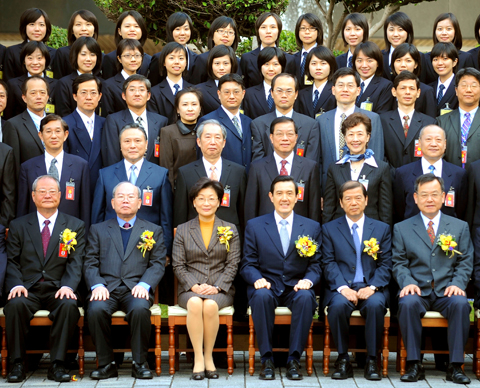President Ma Ying-jeou’s (馬英九) sense of humor was on show again yesterday when he joked that investigators should not smoke when they interrogate suspects to elicit confessions from them.
“How did the investigating agent torture you? Did he beat you? The suspect said no, adding that it was the agents chain-smoking that made him nearly choke to death,” Ma said, recalling a conversation he had with a suspect when he was minister of justice.
“If [investigators] are smokers, remember that [you] should smoke outside and not inside during the interrogation process,” Ma told the 46th graduating class of agents at the Ministry of Justice’s Investigation Bureau in Sindian (新店).

PHOTO: WANG MIN-WEI, TAIPEI TIMES
The average age of the graduates was about 27 years old. There were 41 men and 35 women.
Ma said that the bureau’s top priority was obtaining information concerning national security. However, he also urged agents to probe irregularities and corruption involving government officials to help establish clean government.
He told law enforcement personnel to exercise their powers cautiously because “infringements of human rights are mainly caused by the government and the overexertion of public power.”
Ma said there were fewer illegal wiretapping cases since he took office, adding: “It’s not that I was asking you to forget such measures, but that they should only be conducted when necessary and legal … Only when these principles are abided by can we say that we are a democratic country ruled by law.”

Chinese spouse and influencer Guan Guan’s (關關) residency permit has been revoked for repeatedly posting pro-China videos that threaten national security, the National Immigration Agency confirmed today. Guan Guan has said many controversial statements in her videos posted to Douyin (抖音), including “the red flag will soon be painted all over Taiwan” and “Taiwan is an inseparable part of China,” and expressing hope for expedited reunification. The agency last year received multiple reports alleging that Guan Guan had advocated for armed reunification. After verifying the reports, the agency last month issued a notice requiring her to appear and explain her actions. Guan

GIVE AND TAKE: Blood demand continues to rise each year, while fewer young donors are available due to the nation’s falling birthrate, a doctor said Blood donors can redeem points earned from donations to obtain limited edition Formosan black bear travel mugs, the Kaohsiung Blood Center said yesterday, as it announced a goal of stocking 20,000 units of blood prior to the Lunar New Year. The last month of the lunar year is National Blood Donation Month, when local centers seek to stockpile blood for use during the Lunar New Year holiday. The blood demand in southern Taiwan — including Tainan and Kaohsiung, as well as Chiayi, Pingtung, Penghu and Taitung counties — is about 2,000 units per day, the center said. The donation campaign aims to boost

The Kaohsiung Tourism Bureau audited six hotels in an effort to prevent price gouging ahead of Korean band BTS’ concert tour in the city scheduled for Nov. 19, 21 and 22 this year. The bureau on Friday said that the audits — conducted in response to allegations of unfair pricing posted on social media — found no wrongdoing. These establishments included the local branches of Chateau de Chine, Hotel Nikko, My Humble House, and Grand Hai Lai, it said, adding that the Consumer Protection Commission would have penalized price gougers had the accusations been substantiated. The bureau said the Tourism Development Act

The Central Weather Administration (CWA) said a magnitude 4.9 earthquake that struck off the coast of eastern Taiwan yesterday was an independent event and part of a stress-adjustment process. The earthquake occurred at 4:47pm, with its epicenter at sea about 45.4km south of Yilan County Hall at a depth of 5.9km, the CWA said. The quake's intensity, which gauges the actual effects of a temblor, was highest in several townships in Yilan and neighboring Hualien County, where it measured 4 on Taiwan's seven-tier intensity scale, the CWA said. Lin Po-yu (林柏佑), a division chief at the CWA's Seismological Center, told a news conference